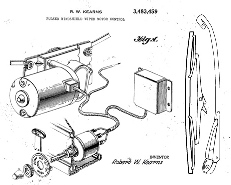 We don’t usually plug movies around here but not too many movies have patent infringement as the major plot line. Universal Pictures’ upcoming film titled Flash of Genius [1], starring Greg Kinnear, Lauren Graham, Dermot Mulroney and Alan Alda, tells the story of the landmark patent case of inventor Robert Kearns.
We don’t usually plug movies around here but not too many movies have patent infringement as the major plot line. Universal Pictures’ upcoming film titled Flash of Genius [1], starring Greg Kinnear, Lauren Graham, Dermot Mulroney and Alan Alda, tells the story of the landmark patent case of inventor Robert Kearns.
Billed as educational while also inspiring and entertaining, the early reviews have been positive. The story is based on the true story of college professor and part-time inventor Robert Kearns’s (Greg Kinnear) long battle with the U.S. automobile industry and his fight to receive recognition for his invention. Kearns took on a battle that nobody thought he could win.
Kearns invented and patented the intermittent windshield wiper mechanism for use in light rain or mist and tried to license it to the big automakers. They all rejected his idea and then some went ahead and put intermittent wipers in their cars beginning in 1969. In 1967, he received the first of more than 30 patents for his wipers. He sued Ford in 1978 and Chrysler in 1982 for patent infringement.
Ford argued that Kearns’ patents were overly broad and therefore invalid. In 1990, a jury decided that Ford infringed on Kearns’ patent, though it concluded the infringement was not deliberate. Ford had contended the patent was invalid because the windshield system contained no new concepts. But Kearns argued a new combination of parts made his invention unique.
That jury failed to reach agreement on how much he should be awarded, and another jury later ordered Ford to pay Kearns $6.3 million, trimmed by a judge to $5.2 million. To settle the case, Ford agreed to pay $10.2 million and to drop all appeals. Chrysler ended up paying Kearns $18.7 million plus interest.
It is noteworthy that Kearns did not want to just collect license fees (what some might call a patent troll today) but instead wanted to be a manufacturer of the devices and supply that system to the automotive industry. When Chrysler appealed to the Supreme Court, it ruled that Kearns was entitled to the money but rejected his argument that Chrysler should be prohibited from using his design
Interestingly, intermittent wipers came about after Kearns was hit in his left eye by a champagne cork on his wedding night in 1953. Later, Kearns was driving his Ford Galaxie through a light rain, and the constant movement of the wiper blades irritated his already troubled vision. He modeled his mechanism on the human eye, which automatically blinks every few seconds.
Some of the patents at issue:
- United States Patent 3,351,836 [2], Windshield Wiper System with Intermittent Operation.
- United States Patent 3,602,790 [3], Intermittent Windshield Wiper System.
- United States Patent 4,544,870 [4], Intermittent windshield wiper control system with improved motor speed.
See the Flash of Genius trailer here [5]. See more “flash of genius [6]” here.